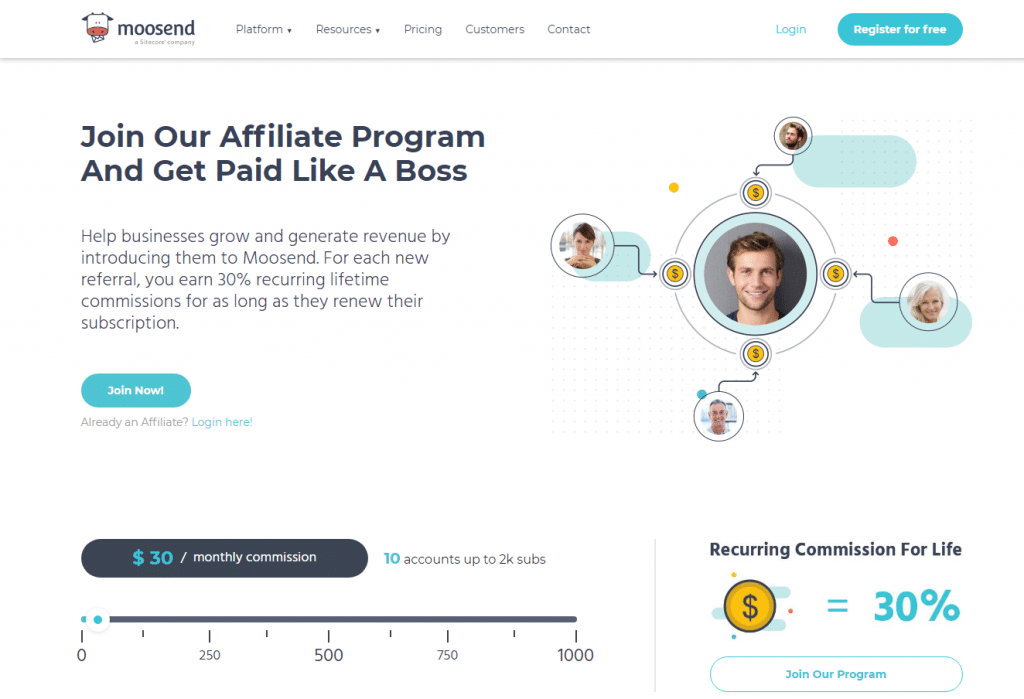The terms “affiliate marketing” and “referral marketing” are often used interchangeably. This can mislead you into thinking that they mean the same thing.
But that’s not the case.
From the outside, affiliate and referral programs may look similar, since they both involve using other people to promote products and services. Once you dive deeper, though, you’ll find that these programs differ from each other significantly.
Join us as we break down referral vs. affiliate programs by looking at:
- Their differences
- Their similarities
- How you can leverage each type of program to work for your business
- How to determine whether a referral program or affiliate program will meet your needs
What is a referral program?
A referral program encourages existing customers to personally recommend your brand to their network of friends, and rewards them when their recommendations result in sales.
These recommendations are sent using trackable referral links, which are created with referral software. The software makes it possible to automatically reward customers whenever their friends purchase from you.
Referral marketing uses trusted recommendations to spread the word about your brand – people trust the advice of those they know most. Thus, referral campaigns have the potential to grow your customer base significantly.

Colourpop’s referral program invites customers to tell their friends about the brand.
What is an affiliate program?
An affiliate program recruits established content creators or influencers, who have an audience similar to your own, to promote your products or services through their blogs, websites, or social accounts.
These creators place an affiliate link to your website on their own channels. Whenever someone clicks on an affiliate link and makes a purchase, you reward the affiliate responsible with a commission.
Affiliate programs are often run with affiliate marketing software, which streamlines most of these operations.
Yes, affiliates’ recommendations are also trusted by their audience. But unlike referral programs, most people targeted by affiliates’ promotions aren’t people that an affiliate knows personally helping make your brand and logo design well known.

Moosend’s affiliate program offers monthly commissions to content creators who drive purchases via their affiliate links.
Differences between affiliate and referral programs
What’s the difference between affiliate and referral programs? There are several key distinctions, including:
1. The people recommending your business
One of the clearest differences between referral programs vs. affiliate programs is the people used to promote the business.
While a referral program uses your customers to make the recommendations, an affiliate program uses third-party brand advocates (content creators like bloggers).
Also, in referral programs, anyone with a reason to recommend you can willingly join the program and start sharing right away.
However, affiliates must first be approved before signing a formal partnership agreement to promote your products or services on their platforms.
2. The relationships these people have with the leads
Referral programs mobilize existing customers to send word about you to their personal network. This network includes people that your customers already know and have an established relationship with, such as friends, family, peers, and colleagues.
On the other hand, affiliates recommend you to their audience of followers who they mostly don’t know personally. For instance, if an affiliate promotes your business on social media, they won’t have a personal relationship with everyone in their social following. Or, when an affiliate promotes your company on their blog, it’s safe to say that the majority of the blog’s readers haven’t met the affiliate in person.
3. The rewards on offer
While rewards are essential driving factors for both referral and affiliate programs, the type of rewards offered differ greatly.
Referral rewards could be discounts, store credits, service upgrades, branded swag, cash, or nearly anything else that motivates customers to share your brand with friends.
You can also choose from a variety of different referral program incentive structures, such as:
- Same reward for every referral
- Varying, tiered rewards as customers make more referrals
- Contests with additional bonuses for top performers
- Double-sided rewards that give something to both the referrer and their friend
However, affiliate programs always use the same base reward – commissions on every sale (almost always paid in cash).
The commissions could be a flat rate fee or a percentage of each sale.
While you could also offer free products or gifts, affiliates will only accept these rewards on top of cash. Most content creators join affiliate programs primarily to make a passive income.
4. How links are shared
The way these two programs are shared is reasonably different, with referral programs usually taking a more direct approach than affiliate programs.
Referral links can be shared via email, social media, SMS, or direct copy and paste. Usually, a referral link is only shared with one friend at a time. The exception is social sharing, which may reach many friends at once.
Affiliate links, on the other hand, are shared on the creators’ websites, blogs, social accounts, or other platforms they own. They are always embedded in content that these affiliates create, which is related to the product or service they’re promoting. And unlike referral links (which are mostly shared with individuals), affiliate links are always shared with a creator’s entire follower network, all at once. Your affiliate can even use a social media scheduling tool to advertise your product in the right way and create a connection with their audience/ Plus, this allows them to keep sharing their content with your link over an extended period of time.
5. The business types that stand to benefit
Since many products and services are suited for referrals, and since you have more freedom to choose your reward spend, a referral program can work for almost any business (including startups and small businesses). You’ll just need a base of satisfied customers who are willing to share your products.
And while referral programs may not scale your business as rapidly as an affiliate program, referred customers are more likely to purchase and become loyal customers.
In contrast, an affiliate program works best for reasonably established businesses with higher profit margins. It also requires your product to have a wider social appeal.
Affiliate programs can rapidly scale your business, but you’ll need to consistently pay out competitive commissions (in cash). Smaller businesses and startups might not be ready to pay these commissions on every sale.
Similarities between affiliate and referral programs
When talking about referral vs. affiliate programs, it is important to not only look at their differences but also their shared features.
Below are the main similarities between affiliate and referral programs:
1. Both are word-of-mouth strategies
Both affiliate and referral programs use independent parties to make recommendations. Thus, they both encourage word-of-mouth marketing to harness the power of social proof. These word-of-mouth recommendations are trusted more than ads coming directly from your business, making the programs reliable.
2. Both involve trackable links
Interestingly, both programs have tracking links containing trackable codes. Each unique code ties purchases made via the link back to the person who shared the link and made the recommendation.
For that reason, both programs require a means of creating these trackable links – usually, referral program software or affiliate program software.
Software also helps businesses manage and run each of the programs effectively.
3. Both rely on reputation and trust
Referral programs are reliant on trust. Nobody wants to mislead their friends by recommending a bad product. Since their friends trust them and are likely to make purchase decisions based on what they say, customers will only share a product if they love it.
Similarly, affiliates only want to share quality products with their follower base, mainly because their public reputation is at stake. They also drive rapid sales since their followers trust them and highly regard their advice.
4. Both are performance-based
One advantage of these programs is that they’re results-oriented. You only pay referral incentives or affiliate commissions after a purchase has been completed. So, unlike traditional ads, you’ll only pay when you see the results. This enables you to control your marketing spend and have a reliable source of revenue and new customers.
5. Both are repeatable
Both referral and affiliate programs encourage repeat business, hence driving consistent growth.
Referral incentives spur customers to share your business constantly, so they can get more rewards.
Plus, they motivate referred customers to pay it forward and regularly refer their own friends, so they can also earn more incentives.
Affiliate programs, meanwhile, allow affiliates to keep their links active on their channels, so they may continue bringing in new customers
In short, both referral and affiliate programs are recurring marketing strategies.
What you need before starting a referral program
To start and run a successful referral program, you need to have the following in place beforehand:
- A healthy base of satisfied customers who want to share your business: Ensure you have a network of happy customers who would willingly recommend you.
- Product that meets customers’ needs: Your product needs to be the reason why customers would share you. By checking reviews, social comments, and customer satisfaction surveys, establish if your product addresses your customers’ pain points.
- Track record of amazing customer service: A stellar customer experience is another key motivator of sharing. Check to see that people are raving about the customer service you offer (again, by looking at reviews and comments).
- Knowledge of what would motivate customers to share with friends: From cash back and gifts to discounts and coupons, ask customers what rewards would most encourage them to make referrals.
- Knowledge of how your customers interact with friends: Whether email, text, or social media, establish what channels your customers use to communicate with their peers.
- Capacity to handle an influx of new customers: Referral programs have the potential to grow your customer base considerably. Consequently, it would help if your customer support team is ready to handle an influx of new users.
- An idea of the referral software you need: You need to have the right software to track the referrals and manage your program effectively. Check out our epic list of the best referral marketing software to find out which option is best for your business needs.
What you need before starting an affiliate program
Similarly, you require the following essentials to run an effective affiliate program:
- Business with higher profit margins: Your business should not only shoulder the affiliate program costs but also maintain a profitable venture.
- A product that appeals to a fairly wide audience: Affiliates have larger audiences with different tastes and preferences. You, therefore, need a product that can appeal more widely.
- Profile of the ideal new customer: Create a clear image or representation of your ideal new customer and their needs, so you can choose affiliates who reach customers like this – and equip affiliates with the tools and messaging to reach this type of customer.
- Ability to recruit content creators who share an audience with yours: You must be able to recruit affiliates who share similar audiences with your business for the best program impact.
- Willingness and ability to pay competitive commissions on every sale: Your business should be able to consistently foot the affiliate commissions without hindering your bottom line.
- High customer retention rate: You’ll need to drive repeat purchases to sustain the recurring commission payments.
- Capacity to handle an influx of new customers: As earlier mentioned, affiliate programs have the potential to scale your business rapidly. Therefore, you require a team able to handle a consistent flow of new customers.
- An idea of how you’ll track sales via affiliate links: For instance, choosing the right affiliate marketing software will let you easily track sales driven by your affiliates.
Which program is right for your business?
So, which program will best meet your business needs – a referral program or an affiliate program? Let’s sum things up so you can make the right decision.
Choose a referral program if:
- You want high-quality leads who are more likely to be loyal customers – and you don’t care if the lead quantities are smaller
- You want to mobilize customers as advocates
- You’re a smaller business or startup (as affiliate programs don’t work as well for smaller businesses)
- Or, you’re a larger business that wants to leverage its customer network
- Referral programs work well for all business types, so they’re still a great option if your business is larger
- You’re looking to foster slow but steady growth
- You want flexibility in how you reward advocates
- Your business is more niche in its appeal
Choose an affiliate program if:
- You want large quantities of leads, and are okay with them being of varying quality
- You want to use the authority of content creators to reach new, relevant audiences
- You’re an established business that wants to scale quickly
- You’re fine with paying cash commissions on every sale
- Your business appeals to a wider audience
Parting shot
While referral and affiliate programs work very differently, both have the potential to grow your customer base and, consequently, your business. They both rely on powerful word-of-mouth marketing to promote your business and bring in new customers.
We hope that this guide has shed more light on the difference between referral vs. affiliate marketing programs. You’re now ready to make an informed decision on which program is the most ideal for your needs – or determine if both can work well for your business.
Ready to start a referral program? Check out these referral program ideas.
Thinking about starting an affiliate program? Here are our top affiliate program best practices.
